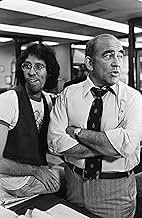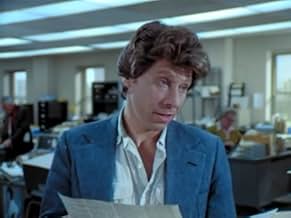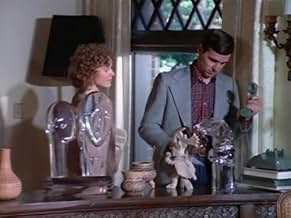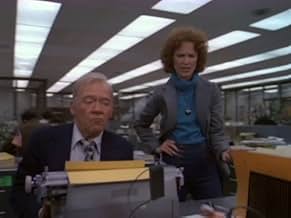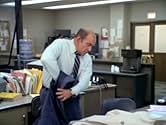IMDb RATING
7.3/10
2.6K
YOUR RATING
The trials of a former television station manager, turned newspaper city editor, and his journalist staff.The trials of a former television station manager, turned newspaper city editor, and his journalist staff.The trials of a former television station manager, turned newspaper city editor, and his journalist staff.
- Won 13 Primetime Emmys
- 28 wins & 73 nominations total
Browse episodes
Featured reviews
I try not to review old stuff from a present day perspective, because those films and shows were meant primarily for people at the time they were made.
Having said that, I love to watch old stuff to revel in the cultural tidbits from bygone eras. L.A. from '77-'82 was still America. People all over town were born in America and were mostly white or black. It was not yet Tijuana , or some other Third World satellite.I love to see the typewriters, old phones, old cars, etc., but I realize that at the time, nothing was old, it was all state-of-the-art.
I also enjoyed seeing the lifestyle of Reporters and Editors on salary. They were not chained to a desk. They could take a long lunch or go about town interviewing people at their leisure. As long as it relates to a story. I like to see how the show incorporates vignettes at restaurants and bars, because they used to play an important role in the Reporter lifestyle.
The mission of a Reporter is to hold the feet of people in power to the fire, or keep them in check so to speak. So yes, investigative reporters would often be hunting down corporate types, cops, the military, etc. That would be the case whether they are liberal or otherwise. Of course this show was developed during the Carter administration and influenced by the general Liberal mentality of that 70s era.
The first episode was more balanced than I expected. Cops are accused of sleeping with teen aged girls, but they claim that the girls looked like women. A reporter with a dad who is a cop, brings in a teenage girl whom everyone thinks is a grown woman. This shows that there was some truth to their claim.
Say what you want about Asner being a blow-hard, but he did play this role with a good deal of intensity and compassion. I don't remember all the social issues brought up, but I don't doubt that they were presented from a Liberal perspective. It's all part of the Hollywood indoctrination process. They used T.V. and film to brainwash multiple generations. But you could say that conservative shows of the 50s and early 60s presented a world view too. The Rifleman comes to mind.
I also loved the presentation of a Newspaper being enormously important as the heartbeat of a city. Again, I am saying this while watching old VHS reruns in the present day. When it was made, Newspapers were kings and no one knew that the Internet was coming in 20 years. So I am watching it as nostalgia. It was not meant as nostalgia when it came out.
Overall, a good ensemble cast, a fun and interesting workplace setting, and some intellectual grit for subject matter. Nice job. It could have been worse.
Having said that, I love to watch old stuff to revel in the cultural tidbits from bygone eras. L.A. from '77-'82 was still America. People all over town were born in America and were mostly white or black. It was not yet Tijuana , or some other Third World satellite.I love to see the typewriters, old phones, old cars, etc., but I realize that at the time, nothing was old, it was all state-of-the-art.
I also enjoyed seeing the lifestyle of Reporters and Editors on salary. They were not chained to a desk. They could take a long lunch or go about town interviewing people at their leisure. As long as it relates to a story. I like to see how the show incorporates vignettes at restaurants and bars, because they used to play an important role in the Reporter lifestyle.
The mission of a Reporter is to hold the feet of people in power to the fire, or keep them in check so to speak. So yes, investigative reporters would often be hunting down corporate types, cops, the military, etc. That would be the case whether they are liberal or otherwise. Of course this show was developed during the Carter administration and influenced by the general Liberal mentality of that 70s era.
The first episode was more balanced than I expected. Cops are accused of sleeping with teen aged girls, but they claim that the girls looked like women. A reporter with a dad who is a cop, brings in a teenage girl whom everyone thinks is a grown woman. This shows that there was some truth to their claim.
Say what you want about Asner being a blow-hard, but he did play this role with a good deal of intensity and compassion. I don't remember all the social issues brought up, but I don't doubt that they were presented from a Liberal perspective. It's all part of the Hollywood indoctrination process. They used T.V. and film to brainwash multiple generations. But you could say that conservative shows of the 50s and early 60s presented a world view too. The Rifleman comes to mind.
I also loved the presentation of a Newspaper being enormously important as the heartbeat of a city. Again, I am saying this while watching old VHS reruns in the present day. When it was made, Newspapers were kings and no one knew that the Internet was coming in 20 years. So I am watching it as nostalgia. It was not meant as nostalgia when it came out.
Overall, a good ensemble cast, a fun and interesting workplace setting, and some intellectual grit for subject matter. Nice job. It could have been worse.
10DA-4
An earlier reviewer's "bleeding heart" references suggest a right-wing orientation. Perhaps this explains his sweeping but unsubstantiated comments concerning how this show's episodes were developed. "Lou Grant" was created by James L. Brooks and Allan Burns, the writer-producers behind "Mary Tyler Moore," and Gene Reynolds, the force behind the TV incarnation of "M*A*S*H," who became the sole Executive Producer in the second year. Younger producers under Reynolds included Seth Freeman from "The Waltons" and Gary David Goldberg. However convenient it may be for people with an agenda to think otherwise the producers, not the star, dictated the content. There's no evidence Edward Asner ever suggested a single storyline, and plenty of testimony crediting others.
The entire MTM library was sold several times after Grant Tinker divested himself in order to run NBC. The likelihood of ever again seeing this fine show, which won 16 Emmys, two Humanitas prizes, and the Peabody Award, is absolutely zilch. Write to 20th Century Fox Television if you'd like the chance to see it, but don't expect to get anywhere.
The entire MTM library was sold several times after Grant Tinker divested himself in order to run NBC. The likelihood of ever again seeing this fine show, which won 16 Emmys, two Humanitas prizes, and the Peabody Award, is absolutely zilch. Write to 20th Century Fox Television if you'd like the chance to see it, but don't expect to get anywhere.
Immigration reform, hate crimes against gay people, teen pregnancy, illiteracy, eminent domain, Ponzi schemes, etc. If I stop here and ask you to finish this, you might conclude with a summary about Bernie Madoff or other recent event.
But these are just some of the many subjects shown weekly on Lou Grant from 1977 to 1982. The stories are over 30 years old but amazingly still every bit as relevant in today's society as they were then. And just as amazing was the incredible risk Mary Tyler Moore's MTM Enterprises took when she transitioned to producing a hard-hitting drama from 2 decades of comedy experience. After winning 3 Golden globes, 23 other awards, and 61 various nominations (IMDB 2012), the show has proved worth the risk in a big way.
I didn't have the education or knowledge of world events (such as it is) to appreciate the show's content when it first aired. But I'm glad I rediscovered and watched these episodes while in a nostalgic mood. Now, I can greatly appreciate how progressive MTM and her staff were in the production of Lou Grant and its relevance to today's events.
But these are just some of the many subjects shown weekly on Lou Grant from 1977 to 1982. The stories are over 30 years old but amazingly still every bit as relevant in today's society as they were then. And just as amazing was the incredible risk Mary Tyler Moore's MTM Enterprises took when she transitioned to producing a hard-hitting drama from 2 decades of comedy experience. After winning 3 Golden globes, 23 other awards, and 61 various nominations (IMDB 2012), the show has proved worth the risk in a big way.
I didn't have the education or knowledge of world events (such as it is) to appreciate the show's content when it first aired. But I'm glad I rediscovered and watched these episodes while in a nostalgic mood. Now, I can greatly appreciate how progressive MTM and her staff were in the production of Lou Grant and its relevance to today's events.
In the final episode of "The Mary Tyler Moore Show"(CBS-TV:1970-1977),when everyone but idiotic anchorman Ted Baxter was fired from station WJM-TV in Minneapolis in 1977,Mary Richards and her fellow casualties were left reeling. It was a bittersweet finale for the beloved series after seven seasons. Then Mary's old crusty boss,station news director Lou Grant,made a smooth transition. Within weeks,he had blown Minneapolis and snagged a good job in Los Angeles as the city editor of The Tribune. That's right:Lou Grant went from the glamour and glitz of TV news(such as it was at bumbling WJM) to embrace print journalism. At The Tribune,the formerly comic Lou(still played by Edward Asner)got serious about news. What resulted was "Lou Grant," a superlative drama series that became one of the greatest dramatic shows ever to embrace the mid-1970's. This was a grand series that arrived in the blazing afterglow of Watergate coverage and the rehealing from the aftermath of the Vietnam War. The bracing message of that era: Two dogged reporters(and a newspaper that backed them up)could change the world-and earn the public's adoration.
Anti-press fulminations from the Nixon administration were largely nullified by scandals and disgrace in the White House. It was only later that an anti-media crusade took hold,drawing the battle lines between the press and the government,and breeding suspicion among much of the citizenry. It was later,as well,that newspapers were obliged to adapt to emerging,unimagined challenges:new media platforms,"citizen journalists",and information-dispersing gadgets with global reach that anyone could buy. The Trib reporters were spared these distractions and identity crises. For them,news still took the form of ink on paper,preferably with comics,crosswords puzzles,and horoscopes were part of the deal. The zeitgeist of "Lou Grant" was set forth in the clever opening sequence and this show celebrated it. Sure it may seem primitive that,in its first season,Trib reports were getting information and their sources with pencil and paper and banging out their stories on the typewriters. But "Lou Grant" was breaking ground from its debut on September 20,1977 producing 114 episodes for CBS-TV until the series finale on September 13,1982. Produced under Mary Tyler Moore's production company,MTM Productions.
Reconfiguring a half-hour sitcom into a hour long drama was risky. The show dared to populate "Lou Grant" with a full-out ensemble cast which not only included Ed Asner,but also Robert Walden who played driven young investigate reporter Joe Rossi;Mason Adams as Managing Editor Charlie Hume;Linda Kelsey as reporter Billie Newman determined to make good in what was at the time a male-domination profession along with another ambitious young girl reporter Carla Mardigian portrayed by Rebecca Balding(who lasted one season). Also on board was the glorious Nancy Marchand(later,of course Tony's craven mother on "The Sopranos")was Mrs. Pynchon,who was the genteel owner of the Trib. Taking full advantage of its news-oriented setting,this was a brilliant series that dealt with issues ranging from nuclear accidents to religious freedom,media ethics and civil and social rights. This was a big-hearted series that won 13 Emmys,two Humanita Prizes and a Peabody award among many honors. This was drama-comedy hybrid that emerged from the series creators:James L. Brooks and Allan Burns(the writers-producers from "Mary Tyler Moore"),along with Gene Reynolds(who was not only the principal behind the TV incarnation of "M*A*S*H",but also was the producer of such shows as "Room 222"). This was a series that broke ground in the way television dramas are depicted and to this day it still holds the title some 30 years later.
Anti-press fulminations from the Nixon administration were largely nullified by scandals and disgrace in the White House. It was only later that an anti-media crusade took hold,drawing the battle lines between the press and the government,and breeding suspicion among much of the citizenry. It was later,as well,that newspapers were obliged to adapt to emerging,unimagined challenges:new media platforms,"citizen journalists",and information-dispersing gadgets with global reach that anyone could buy. The Trib reporters were spared these distractions and identity crises. For them,news still took the form of ink on paper,preferably with comics,crosswords puzzles,and horoscopes were part of the deal. The zeitgeist of "Lou Grant" was set forth in the clever opening sequence and this show celebrated it. Sure it may seem primitive that,in its first season,Trib reports were getting information and their sources with pencil and paper and banging out their stories on the typewriters. But "Lou Grant" was breaking ground from its debut on September 20,1977 producing 114 episodes for CBS-TV until the series finale on September 13,1982. Produced under Mary Tyler Moore's production company,MTM Productions.
Reconfiguring a half-hour sitcom into a hour long drama was risky. The show dared to populate "Lou Grant" with a full-out ensemble cast which not only included Ed Asner,but also Robert Walden who played driven young investigate reporter Joe Rossi;Mason Adams as Managing Editor Charlie Hume;Linda Kelsey as reporter Billie Newman determined to make good in what was at the time a male-domination profession along with another ambitious young girl reporter Carla Mardigian portrayed by Rebecca Balding(who lasted one season). Also on board was the glorious Nancy Marchand(later,of course Tony's craven mother on "The Sopranos")was Mrs. Pynchon,who was the genteel owner of the Trib. Taking full advantage of its news-oriented setting,this was a brilliant series that dealt with issues ranging from nuclear accidents to religious freedom,media ethics and civil and social rights. This was a big-hearted series that won 13 Emmys,two Humanita Prizes and a Peabody award among many honors. This was drama-comedy hybrid that emerged from the series creators:James L. Brooks and Allan Burns(the writers-producers from "Mary Tyler Moore"),along with Gene Reynolds(who was not only the principal behind the TV incarnation of "M*A*S*H",but also was the producer of such shows as "Room 222"). This was a series that broke ground in the way television dramas are depicted and to this day it still holds the title some 30 years later.
Judged by 1977-82 standards, this show was peerless.
Today, it's a bit "dated" in certain ways. But these elements actually make it a valuable portrait of its era.
Talented cast, right down the line. Terrific writing. Skillful, sensitive directing. Highly relevant. Courageous. And one of TV's all-time-best role models in the lead.
Every Emmy -- & there were MANY -- was fully deserved. Also the Peabody, the Humanitas, & all the other awards it won.
Each season was as strong as or stronger than its predecessor; this is one show that was NOT running out of steam.
In fact, during the Reagan Years, we needed it more than ever! (Would have loved to see its take on Iran-Contra.)
Shame on CBS for bowing to pressure because of Asner's politics and the show's oft-controversial scripts.
LOU still shines.
Waiting impatiently for (legal) DVD release!
Today, it's a bit "dated" in certain ways. But these elements actually make it a valuable portrait of its era.
Talented cast, right down the line. Terrific writing. Skillful, sensitive directing. Highly relevant. Courageous. And one of TV's all-time-best role models in the lead.
Every Emmy -- & there were MANY -- was fully deserved. Also the Peabody, the Humanitas, & all the other awards it won.
Each season was as strong as or stronger than its predecessor; this is one show that was NOT running out of steam.
In fact, during the Reagan Years, we needed it more than ever! (Would have loved to see its take on Iran-Contra.)
Shame on CBS for bowing to pressure because of Asner's politics and the show's oft-controversial scripts.
LOU still shines.
Waiting impatiently for (legal) DVD release!
Did you know
- TriviaMrs. Pynchon, the widowed owner of the fictional Los Angeles Tribune, was based on Katherine Graham, the real widowed owner of the Washington Post, and on Dorothy "Dolly" Schiff, owner and publisher of the New York Post. Schiff, for example, always carried her small dog with her, like Mrs. Pynchon.
- Quotes
Billie Newman: I hate it when people tell me to calm down!
- ConnectionsFeatured in The 30th Annual Primetime Emmy Awards (1978)
- How many seasons does Lou Grant have?Powered by Alexa
Details
- Release date
- Country of origin
- Language
- Also known as
- Gazeteciler
- Filming locations
- The Title Guarantee & Trust Building, 411 West 5th Street, Los Angeles, California, USA(Los Angeles Tribune Building)
- Production company
- See more company credits at IMDbPro
Contribute to this page
Suggest an edit or add missing content



